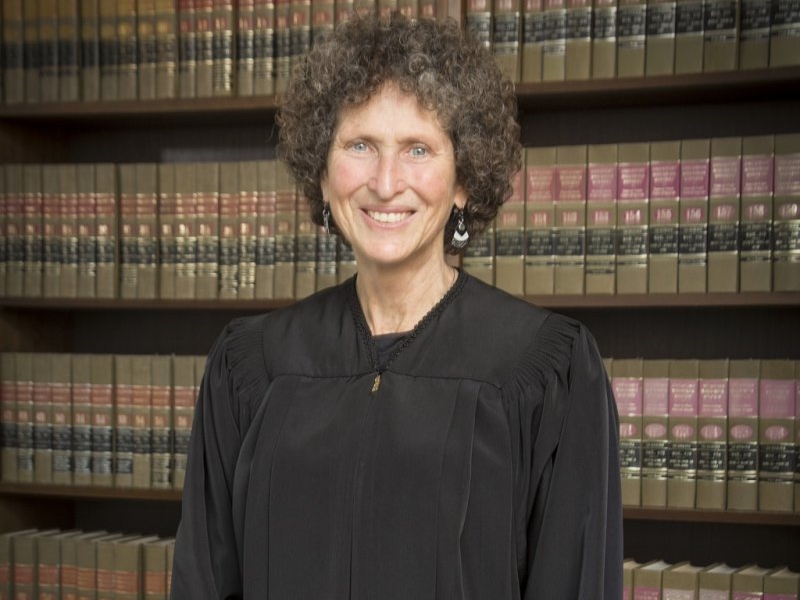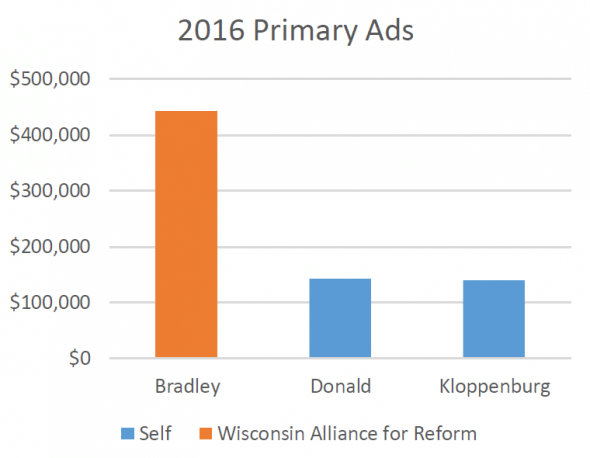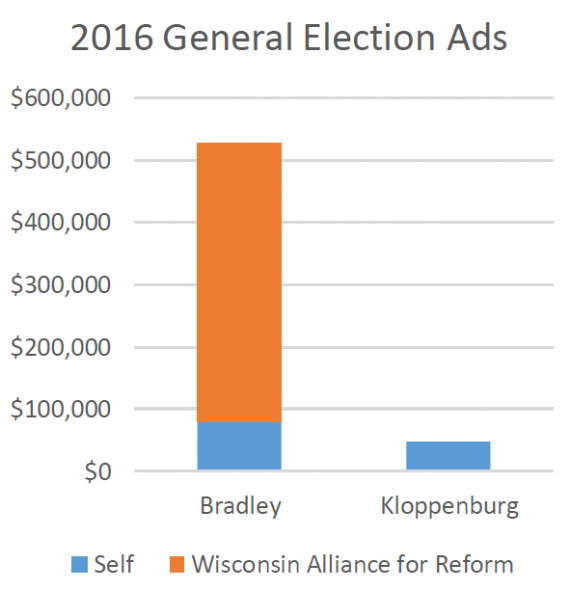Media Used By Right Against Kloppenburg
Journal Sentinel attacks Kloppenburg on unproven issue raised by right-wing.
In a March 15 front-page article, the Journal-Sentinel and its reporter Patrick Marley in effect accused Wisconsin Appeals Court Judge—and Supreme Court candidate–JoAnne Kloppenburg of hypocrisy by participating in a decision involving an organization that had opposed her election. This accusation is implicit in the first two paragraphs of Marley’s article:
In her two bids for the state Supreme Court, JoAnne Kloppenburg has criticized as too weak an ethics rule that says political spending on its own isn’t enough to force a judge off a case.
But as an appeals judge in 2014, Kloppenburg remained on a case involving a group that spent against her in her unsuccessful 2011 race for the high court. Her ruling kept alive an investigation of Gov. Scott Walker‘s campaign, the Wisconsin Club for Growth and other conservative organizations.
The insinuation is also implicit in the headline added by Marley’s editor: “JoAnne Kloppenburg stayed on case involving group that opposed her.”
Marley does not point to any rule—either in existence or proposed—in Wisconsin or elsewhere that supports the theory that a judge should recuse herself if one or the other party in a case supported her opponent. For authority the best he can do is quote the conservative legal activist Rick Esenberg:
The problem, of course, is that if you can’t sit on a case that might involve someone who has spent on your behalf, you ought not be able to sit on one involving people that spent against you,” Esenberg said by email. “A debt of gratitude is no greater source of bias than a desire for revenge. In fact, in my experience, vengeance is often far more powerful than gratitude.”
Since then, Kloppenburg’s opponent, Rebecca Bradley, has picked up the same theme. In a debate she criticized Kloppenburg for not recusing herself. Should judges recuse themselves when one of the parties worked to defeat that judge?
There is superficial symmetry to this argument, as Esenberg points out. However, in practice it would serve to undermine the goal of reducing the influence of campaign money in judicial elections and protecting the independence of the courts.
Wisconsin is already receiving negative attention nationally for the amount of money spent in the last few state Supreme Court races. At some point, an impression that the court is for sale to the highest bidder hurts the state’s attractiveness to companies. That was reflected in the brief from several large companies in the Caperton case in which the US Supreme Court ruled that a West Virginia justice benefitting from huge donations from one of the parties should have recused himself. Courts viewed as independent are good for the economy.
Today the current Wisconsin Supreme Court election is already following the pattern of very large spending, particularly on the right. The graph to the right shows spending on the primary, estimated by the Brennan Center for Justice.
Apparently Rebecca Bradley spent none of her own funds, presumably saving them for the general election. Instead the role previously played by Wisconsin Manufacturers and Commerce (WMC) and the #Wisconsin Club for Growth# seems to have been taken over by a new right-wing group, called the Wisconsin Alliance for Reform. The Alliance is also running ads against Russ Feingold and distributed flyers attacking Iowa county DA Larry Nelson, presumably to punish him for his participation in the John Doe investigation of coordination between Walker and outside groups. That strongly suggests the Alliance is connected to the Club for Growth or WMC, who were targets of the Doe investigation.
Preliminary estimates from the Brennan Center show the Alliance for Reform ramping up spending up its spending in the general election. Note that these are estimates based on FCC reports from television and radio stations. The Alliance uses the “social welfare organization” loophole to avoid report its spending or its donors. By next Tuesday’s election, it is likely that spending by both sides will be much larger than so far reported.
It is worth noting that groups supporting a particular judge for either ideological or economic reasons seldom disclose their true motivation. Instead the standard approach, on both the right and the left, is to pose as concerned about the criminal justice system: they go through the records to find cases in which the target of their ads could be made to appear too lenient on a defendant.
Could bitterness about the attacks from the WMC and Club for Growth have affected Kloppenburg’s thinking in ruling against a challenge to the John Doe investigation of collaboration between these two groups and Friends of Scott Walker? One can never know for sure. However, the fact that she was one of three judges–one of whom was originally appointed by Republican Gov. Tommy Thompson–who joined in a unanimous decision shows the ruling found legal grounds that satisfied all three judges.
It’s no surprise that Bradley and Esenberg would charge Kloppenburg with hypocrisy. But what of Marley and the Journal Sentinel? Why wouldn’t Marley have consulted a less partisan expert on judicial ethics or the Journal Sentinel used a less loaded headline?
The Kloppenburg story closely followed articles disclosing Bradley’s bizarre writings while attending Marquette and her representation of a client with whom she was romantically involved. These elicited strident denunciations of the newspaper from the right, such as this from the Wisconsin Watchdog:
The Milwaukee Journal Sentinel has shown its hand in its disparate coverage of the conservative justice and her liberal opponent for the Supreme Court seat, Appeals Court Judge JoAnne Kloppenburg. It’s clear that the newspaper that has spewed so much hatred over the past several years against Republican Gov. Scott Walker is going after his appointee to the bench, while handling with kid gloves the liberal candidate who falls in line with the newspaper’s ideological slant.
The Watchdog is an online publication that got much of its funding from a group set up by Wisconsin Club for Growth leader Eric O’Keefe, and that has run hundreds of articles attacking the Doe investigation and/or defending O’Keefe. But its attacks and those by conservative talk radio host Charlie Sykes may have had an impact on the Journal Sentinel.
The newspaper’s story implicitly accusing Kloppenburg of an ethics violation may show it in damage control mode, looking to “balance” the Bradley disclosures and thereby show its even-handedness. Unfortunately, to advocate that judges recuse themselves when a party has worked to defeat him or her would only reward and encourage those who have already politicized the Wisconsin Supreme Court.
Data Wonk
-
Scott Walker’s Misleading Use of Job Data
 Apr 3rd, 2024 by Bruce Thompson
Apr 3rd, 2024 by Bruce Thompson
-
How Partisan Divide on Education Hurts State
 Mar 27th, 2024 by Bruce Thompson
Mar 27th, 2024 by Bruce Thompson
-
Will Wisconsin Supreme Court Legalize Absentee Ballot Boxes?
 Mar 20th, 2024 by Bruce Thompson
Mar 20th, 2024 by Bruce Thompson



















When that story ran I wondered if the JS was trying to compensate for a barrage of criticism from conservatives about its Bradley coverage. “See, we cover criticism of Kloppenburg too! We’re fair.”
This also reminds me of how puzzling media bias criticism from conservatives is at the local level. You’ve got right-wing talk radio dominating the airwaves in addition to groups and publications like WILL, Right Wisconsin, Media Trackers, and Wisconsin Watchdog, not to mention people from those organizations who are regularly published in the JS (along with Christian Schneider). It sure feels like conservative voices dominate locally, but still people moan and groan about liberal media bias.
“In fact, in my experience, vengeance is often far more powerful than gratitude.”–
Contemplate how stupid that is, comically so coming from a lawyer. Unless he is a lousy lawyer who’s clients have no reason to express gratitude. It is also ironically Christian, as Attorney Esenberg oft seems to claim some sort of special insight into the workings of God when he wants to make some idiotic point about the superiority of straight marriages like those of Messrs. Trump and Cruz.
This is no surprise, given that the J-S is so intimidated by the right-wing noise machine that they pull these absurd “make-up call” type articles when some right-winger acts horrible and is (rightfully) called out for it. And that’s why the righties in their propaganda machine do what they do- it slants coverage their way, and is really a version of “working the refs.”
And the noise machine can make up garbage that gets legitimacy when Dan Bice and company feel they have no choice to follow up on it because “people are talking.” Best example about that was the lie from a Jefferson Co GOP official that claimed Mary Burke was fired from Trek, Bice dutifully ran the story, and then the (generally false) story magically went away after November 4, 2014. But the damage was done.
You are misstating my position – which I developed in a law review article in 2010 long before this election. I don’t think Kloppenburg had a duty to recuse. I’ve said that over and over. But under the rationale for recusal developed in the Caperton case, there is simply no basis for distinguishing between campaign support and campaign opposition. Both can create a risk of bias – whether it be a debt of gratitude or the natural resentment one might feel toward one’s opponent. If you think that risk of bias is enough for recusal, then its got to be recusal all around. You are arguing for a categorical exception for campaign opposition because, if we don’t have one, advocacy organizations who express opposition to a candidate who wins will have a second “kick at the can.” But Caperton supports no such exception. . If campaign spending creates a risk of bias that warrants recusal then it does so for those who supported winners as well as losers. Your exception isn’t about assuring fairness in a particular case. It expressly ignores it. It ignores it in order to dissuade campaign advocacy. Because of that, I suspect such a distinction would be vulnerable to constitutional challenge under other precedents that limit the bases on which the state can regulate speech in judicial elections. My own view is that you have to read Caperton narrowly or it winds up at war with judicial elections which, rightly or wrongly, we have decided to use to select judges. (And, as for “matt,” I don’t think you’ve ever read the stuff I write. I don’t claim to know the mind of God and my position on marriage was expressly secular. I actually don’t regard myself as a particularly religious person although I try.)
When an opening occurs on the Iowa Supreme Court a committee made up of lawyers, professors of law, and other knowledgeable people, select a roster of candidates whom they vet. This committee chooses several candidates for
consideration by the governor, who makes the final decision. After serving one year the Supreme Court Judge is placed on a ballot to retain or not. By that time the people will know something about that judge’s voting record. The decision to retain or not is made by voters. No campaigns, no ads, no smears, no big money. If voted to retain I believe the judge serves 7 years and then is again placed on a ballot to retain.
Caperton is based on the notion that the due process rights of a party to litigation would be violated if the judge might reasonably feel “a debt of gratitude” to the litigant’s opponent, whose outsized contributions helped the judge to get elected to the judicial post. There’s no similar “debt of gratitude” to a litigant who spent lavishly to oppose the judge’s election. But more, that lavishly-spending litigant was unsuccessful – the judge was elected anyway. You can imagine, I suppose, that the judge would be so consumed by “vengeance” at the litigant who wasted lots of money opposing the judge that he or she would toss objectivity out the window, but why does it make sense to think that? It’s a lot easier to be magnanimous when you win. It is particularly strained for Mr. Eisenberg, who disagrees with Caperton in the first place, to be arguing in favor of this kind of counterintuitive extension of what he views as its flawed logic.
The source for Mr. Esenberg’s argument is an article by two founders of the anti-regulation Center for Competitive Politics. It attacks the Caperton decision by asserting “whether the $3 million was spent independently to support the judicial candidate or to oppose him matters little to the perceived impartiality of the judge.” As Mr Hughes suggest there is no reason to accept this logic.
I know of no ethics standard–actual or proposed–that would suggest that judges must recuse themselves when one of the parties opposed their election. To do so would gaming the system by those wishing to buy a certain decision.
What I think is reprehensible is the suggestion that Kloppenberg violated some standard (or was hypocritical) by not recusing herself on the John Doe case.
Klop was defeated by the naitonal attention on the Trump/Cruz battle for 3 weeks bringing out the GOP vote,100,000 more.
This defeated Rebecca, despite the sloppy smears of Bruce, and Abele. Simple math.